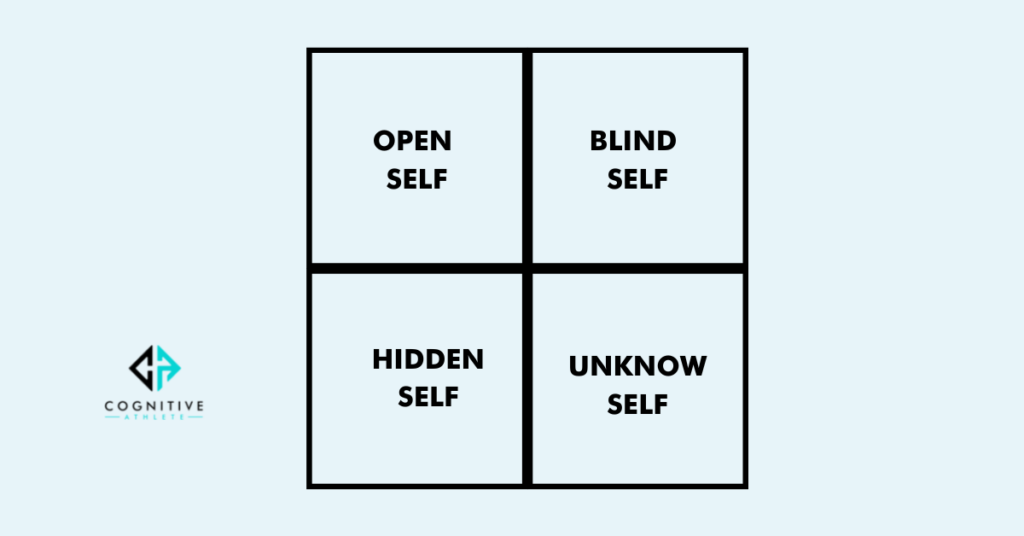
Effective leadership involves more than just giving orders and making decisions. To be an effective leader, you must possess strong communication skills, empathy, and self-awareness. Self-awareness is essential for any leader as it helps you understand your strengths, weaknesses, and values. It allows you to identify your blind spots and biases, enabling you to make better decisions and build stronger relationships with your team.
One tool that can help leaders improve self-awareness is the Johari Window. The Johari Window is a psychological model that helps individuals understand themselves and their relationships with others. In this article, we will explore how the Johari Window can help leadership and provide practical tips on how to apply it to enhance your leadership style.
The Four Quadrants of the Johari Window:
- Open or Arena
- Blind Spot
- Hidden or Facade
- Unknown

The Four Quadrants of the Johari Window are crucial for understanding the different aspects of our personality and how they impact our relationships with others. Let’s take a closer look at each quadrant and how it can help us in leadership:
The Open or Arena quadrant represents what we know about ourselves and what others know about us. This quadrant is essential for building trust and rapport with others, as it involves sharing information about ourselves that can help others understand our perspectives, motives, and values.
The Blind Spot quadrant represents what we don’t know about ourselves but others do. This quadrant is crucial for receiving feedback and improving our self-awareness. By listening to feedback from others, we can identify blind spots in our behaviour or communication and work to address them.
The Hidden or Facade quadrant represents what we know about ourselves but others don’t. This quadrant can be challenging for leadership, as it involves sharing information about ourselves that may make us feel vulnerable or uncomfortable. However, sharing this information with others can build trust and empathy and foster a culture of openness and transparency.
The Unknown quadrant represents what we don’t know about ourselves or others. This quadrant is challenging to address, as it involves exploring unknown territory and discovering new aspects of ourselves or others. However, by being open to new experiences and perspectives, we can expand our self-awareness, build empathy, and develop new skills and abilities.
Why is Self-Awareness Important for Leadership?
Leadership is more than just giving orders or making decisions. A good leader inspires and motivates their team to achieve success. And the foundation of this inspiration and motivation is self-awareness.
Self-awareness is the ability to understand your own emotions, thoughts, and behaviours, and it is an essential component of emotional intelligence and a crucial element of effective leadership. With self-awareness, leaders can connect with their team more deeply and understand their needs and motivations.
The Role of Self-Awareness in Leadership
Self-awareness allows leaders to understand their strengths and weaknesses, enabling them to play to their strengths and improve their weaknesses. It helps leaders make better decisions by understanding their biases and how they may affect their judgment. It also allows leaders to connect with their team members on a deeper level, building trust and understanding.
A self-aware leader is also better equipped to handle difficult situations. They are less likely to react impulsively and more likely to make decisions based on a deep understanding of their own emotions and thoughts. This leads to more effective communication and a more productive work environment.
The Link between Self-Awareness and Emotional Intelligence
Self-awareness is a critical component of emotional intelligence. Emotional intelligence is the ability to recognise and understand emotions in yourself and others and use this understanding to manage relationships and communicate effectively. An emotionally intelligent leader has a greater experience of their own emotions and the emotions of their team members, which leads to more effective communication and a more positive work environment.
Self-aware and emotionally intelligent leaders are also better equipped to manage stress and handle conflict. They are less likely to react negatively to stressful situations and more likely to remain calm and rational. This, in turn, leads to a more positive and productive work environment.
Self-awareness is a crucial component of effective leadership. It allows leaders to understand their own emotions, thoughts, and behaviours and use this understanding to build stronger relationships with their team members. Leaders can improve their decision-making, communication, and overall effectiveness by developing self-awareness. So, to be a successful leader, start by developing your self-awareness and emotional intelligence.
How Can the Johari Window Help Leadership?
- Enhancing Self-Awareness
- Improving Communication
- Building Trust
- Facilitating Feedback
- Strengthening Relationships
Applying the Johari Window in Leadership: Practical Tips
Assessing Your Current Leadership Style:
The first step to applying the Johari Window in leadership is to assess your current leadership style. You can do this by reflecting on your interactions with your team, how you make decisions, and your communication style. It can be helpful to ask for feedback from colleagues or team members to understand better how you are perceived as a leader. If you want to improve as a leader check out our other articles on the importance of coaching leaders here and here.
Identifying Your Blind Spots:
The Johari Window helps individuals understand their blind spots and areas of their personality or behaviour that they are unaware of. As a leader, identifying your blind spots is essential as it can help you avoid making decisions or taking actions that could negatively impact your team. You can identify your blind spots by seeking feedback from colleagues or team members and being open to constructive criticism.
Seeking Feedback:
Seeking feedback is an essential part of the Johari Window. As a leader, seeking feedback from your team and being open to constructive criticism is crucial. Feedback can help you identify your blind spots, enhance your self-awareness, and improve your communication and leadership style. Encourage your team to provide feedback on your performance and make sure to act on it.
Encouraging Open Communication:
The Johari Window emphasises the importance of open communication. As a leader, it is crucial to encourage open communication within your team. Encourage your team to share their thoughts, ideas, and feedback with you and with each other. This can help build trust within the team, enhance communication, and promote a positive work environment.
Building Trust:
Trust is a crucial element of any successful team. The Johari Window can help leaders build trust by promoting open communication and self-disclosure. As a leader, being open and honest with your team and encouraging them to do the same is essential. When your team trusts you, they are likelier to follow your lead and work towards a common goal.
In conclusion, the Johari Window is an effective tool for leaders to improve their self-awareness, enhance communication, and build trust within their team. By applying the Johari Window in leadership, leaders can identify their blind spots, seek feedback, and improve their leadership style. It requires a willingness to be vulnerable and open to feedback, but the benefits are invaluable.
As a leader, it is essential to prioritise self-awareness, open communication, and building trust within your team to create a positive and productive work environment. So, how can the Johari Window help leadership? It all starts with a commitment to self-awareness and a willingness to improve.
If you want to talk more about the window and developing self-awareness book a call here.
All the best
Lee
